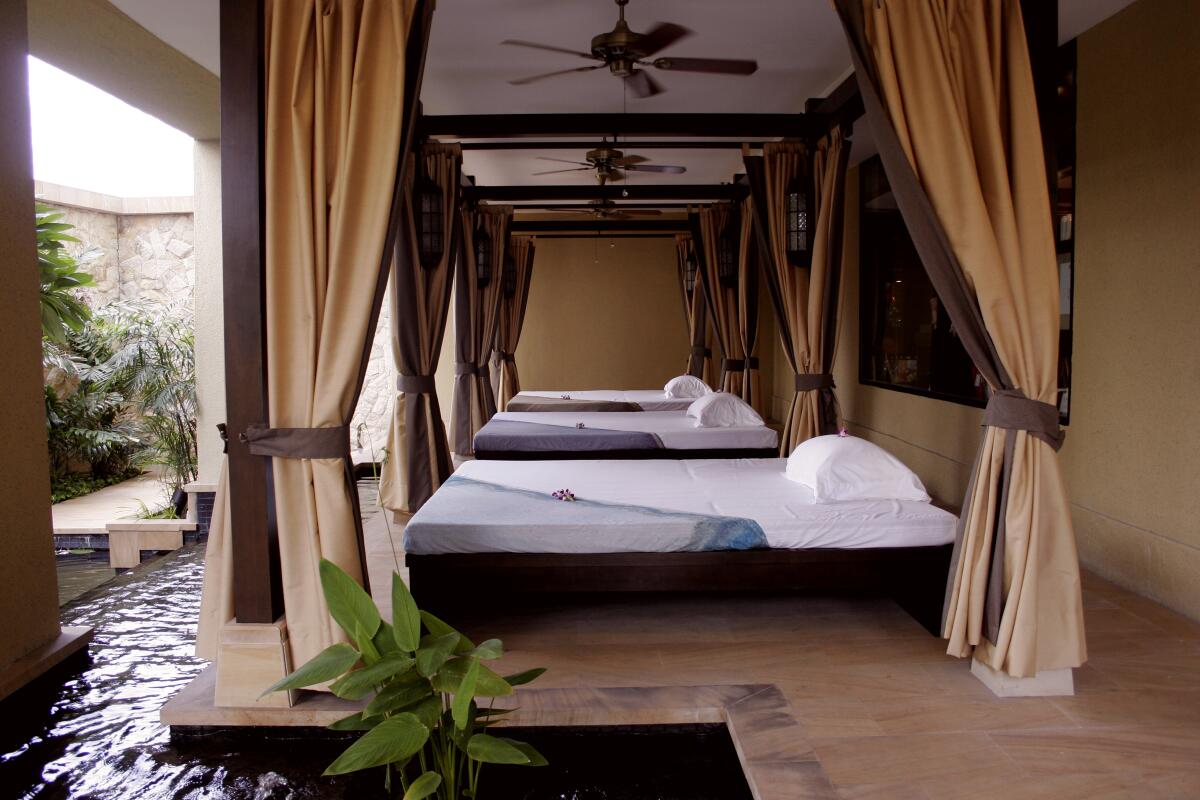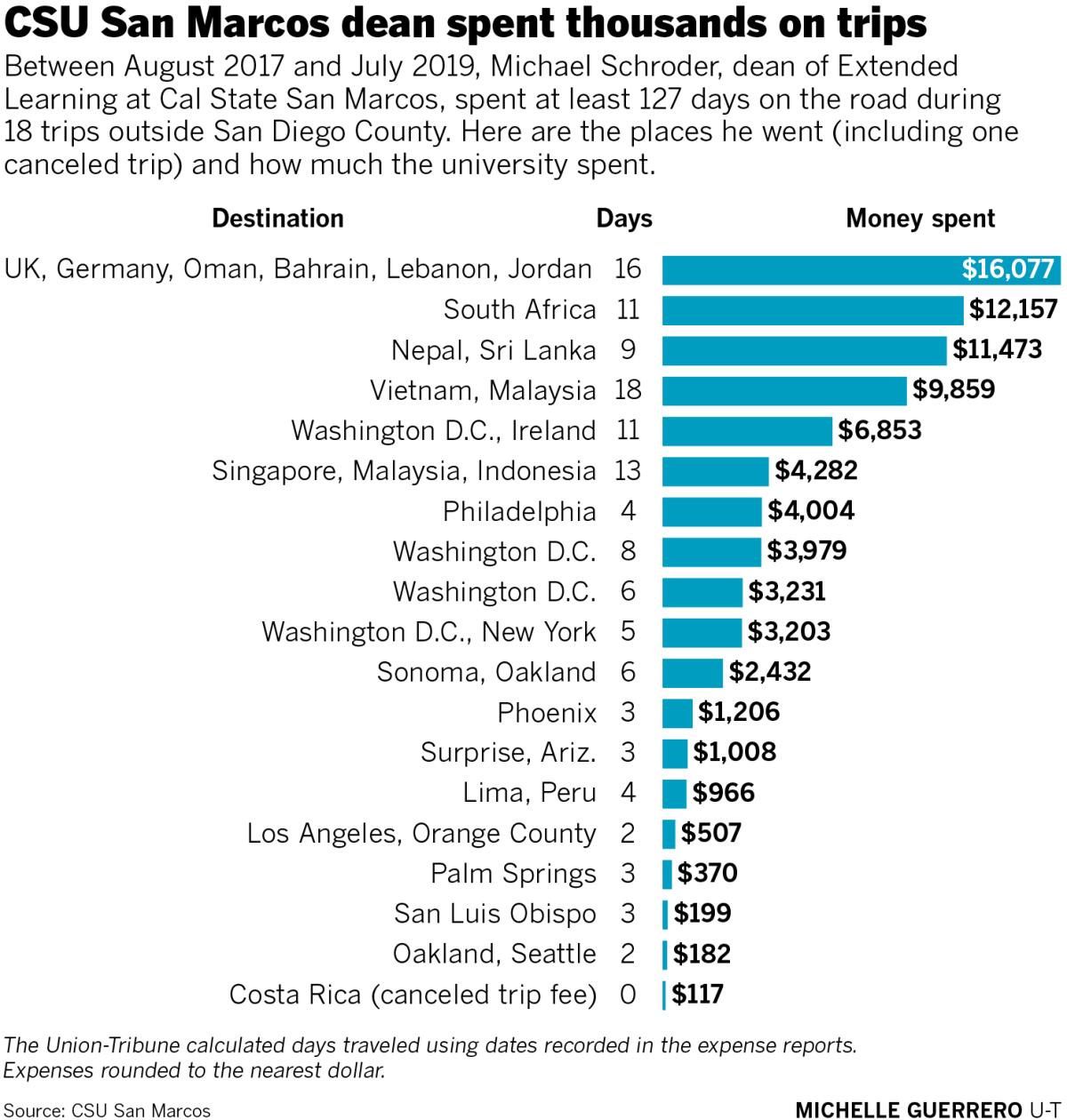Audit launched into Cal State San Marcos dean’s travel expenses
SAN DIEGO — The California State University system is investigating the business spending of a Cal State San Marcos dean who stayed at Ritz-Carlton hotels, took chauffeured car rides and bought expensive meals including a $110 steak.
Michael Schroder, dean of extended learning and associate vice president for international programs, filed dozens of such expenses over the past two years, including first-class travel, limousine rides and multi-night stays at luxury hotels like the Ritz-Carlton in Bahrain, where the $345 daily rate exceeded the university limit, according to a U-T Watchdog review of his expense reports dating to August 2017.
The Union-Tribune obtained his expense documents under the California Public Records Act and found irregularities including resort stays miles from the destinations cited in his travel requests. He expensed round-trip airfare from Los Angeles to South Africa for $6,636 and an all-day taxi bill of $256 to and from his Kathmandu hotel to a private college less than four miles away.
After the Union-Tribune asked about the reimbursements, university officials said they could not discuss the expenses because the case is now under investigation.

“I can’t speak to the spending, given we now have this audit investigation,” Margaret Chantung, the Cal State San Marcos associate vice president for communications, said in an interview last week. “President (Ellen) Neufeldt is deeply committed to complying with system policies.”
Chantung said the investigation is being conducted by the CSU Chancellor’s Office in Long Beach. She declined to discuss the scope of the audit or say how many years of spending the review might entail. She noted that Neufeldt took office July 1 and launching the audit was one of her first acts.
“We do take this commitment to act as loyal fiscal stewards to state and students very seriously,” she said. “It’s essential that the university be strong fiscal stewards. That is critical to our mission.”
Schroder did not respond to requests for comment or provide any explanation for the expenses.
According to Chantung, Schroder is now on leave from the university for medical reasons. She declined to say when his employment status changed. Schroder, 49, was hired at Cal State San Marcos in 2011.
Chantung also said Graham Oberem, the vice president who approved many of the expense requests, retired June 30. That was three days after the university received an anonymous complaint raising questions about Schroder’s spending practices. Oberem did not return messages seeking comment about his approvals.
Since August 2017, Schroder has made 18 trips on behalf of Cal State San Marcos, including six international journeys to 15 countries. All told, records show the university spent $82,000.
Management experts say the spending appears excessive for a public agency.
“It’s a terrible example,” said William Sannwald, a lecturer at San Diego State University who previously served as a senior San Diego city official. “Any time you’re traveling on the taxpayers’ money, you shouldn’t penalize yourself but you should not be lavish either.”
Sannwald said spending practices like those shown in Schroder’s travel records reflect poorly on the official and the institution -- and students may find such expenses difficult to stomach in light of increasing tuition.
“The key thing is the image for the individual and the reflection on the university,” he said. “There are all kinds of students really scrimping in order to take classes.”
Kenny Tran, a business marketing major who also serves as president of the Associated Students at Cal State San Marcos, said he was sorry to hear about the dean’s spending habits and grateful that university officials are investigating.
“The university should be ensuring student fees are spent ethically and they are upholding a strong fiduciary responsibility to students,” Tran said in an email.
One of the projects organized by the nonprofit Associated Students is a food pantry that distributes canned goods, produce and toiletries for needy students. The effort costs about $80,000 a year.
Last year, the charity increased student fees from $50 to $75 per semester, in part to support the pantry. A 2016 survey found that more than half of Cal State San Marcos students reported instances of “food insecurity.”
Most of the travel costs paid by the university for Schroder’s expenses appear to be associated with his work as director of international programs.
The Global Programs and Services department budget last year was $1.7 million, with $290,000 set aside for out-of-state travel. It has 19 employees, excluding the dean. The program is critical to attracting foreign students and promoting cultural exchanges between students, faculty and organizations, the university said.
“Dean Schroder oversees efforts to internationalize the Cal State San Marcos educational experience through a wide variety of initiatives,” Chantung said. “This includes the creation of opportunities for CSUSM students to study abroad, increasing the number and diversity of international students at CSUSM, supporting international faculty collaboration and fostering links with institutions of higher education in other countries.”
According to university records, the Cal State San Marcos enrollment was just under 16,000 last year, including graduate and undergraduate students. Some 382 students were from foreign countries, and 70 percent of those arrived from just six nations. Five years ago, the school had 338 foreign students.
China was the home country for 30 percent of international students; Saudi Arabia ranked second at 13 percent; India accounted for 9 percent; Norway was home to 7 percent; and Korea and Japan accounted for 5 percent each.
Schroder’s travel records show one visit to those countries in the past two years — a three-hour layover in Delhi, India, en route to Kathmandu.
He was visiting Malaysia, South Africa and the Sultanate of Oman on the southeast corner of the Arabian Peninsula, records show.
For his weeklong trip to South Africa last August, Schroder paid a chauffeur $218 for a ride from the airport to the Cape Town City Centre Hilton, where he arrived at 10:40 a.m. and stayed one night before setting out for Port Elizabeth, the records show.
On his way east, Schroder stayed in a suite for one night at Diaz 15 House on the Bay, which rented for $372. The next night he stayed in a studio at Buffelsdam Country House, a luxury retreat 90 miles from Diaz 15. The studio rented for $351.
The Cal State dean spent the next five nights at the Five Star Beach House, a resort of “classic elegance” just 100 meters from the sand, to meet with officials from Nelson Mandela University in Port Elizabeth. The beach house rented for $116 a night; the receipt lists two guests.
Schroder also traveled across the United States, logging trips to Washington, D.C., Philadelphia, Seattle and Northern California, among other places.
During a business trip to Washington, D.C., in May, Schroder spent $948 for dinner at Mastro’s Steakhouse. The order included five filets costing up to $110 each, two servings of lobster mashed potatoes at $38 a pop, a $14 plate of sweet potato fries and other high-end treats.
When Schroder sought reimbursement for the meal, he included handwritten notes listing the other 12 people he said attended the dinner. The restaurant receipt shows there were five guests, which correlates with the five entrees ordered.
The San Diego Union-Tribune reached out to all the guests listed on the expense report in an effort to understand why the restaurant receipt listed five people, while the expense report listed 13 attendees.
Only one, Professor Henning Kehr of the University of Applied Sciences, Worms, in Germany, responded. Kehr said there were numerous tables at the dinner, and approximately eight people at his table alone.
Attendees ate a host of gourmet appetizers, including sauteed asparagus, crab-stuffed mushrooms, creamed spinach and Blue Point oysters on the half shell, according to the receipt Shroder included in his expense report. They drank $9 bottles of San Pellegrino and topped off dinner with crème brûlée, key lime pie and chocolate sin cake, at $11 each. Including tax, the bill came to $798.

Schroder, who signed the expense report June 17 and personally certified that the charges complied with state law and university policy, left a $150 tip.
Schroder also chose upscale accommodations during domestic travel, including a trip he made to Northern California in April for a “meeting at CSU East Bay and (to) attend the CSU Deans meeting at Sonoma State,” records show.
Schroder stayed four nights at Andrea’s Hidden Cottage, a $340-a-night vacation rental in the city of Sonoma — 65 miles north of CSU East Bay and 20 miles from Sonoma State University. Records show he flew first class home to San Diego.
Chantung was unable to estimate when the Chancellor’s Office audit would be completed, and she said the findings would be publicly released by the university.
McDonald and Cook write for the San Diego Union-Tribune.
More to Read
Sign up for Essential California
The most important California stories and recommendations in your inbox every morning.
You may occasionally receive promotional content from the Los Angeles Times.












